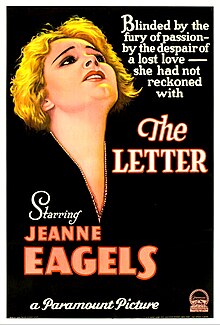The Letter (1929 film)
| The Letter | |
|---|---|
 Film poster | |
| Directed by | Jean de Limur |
| Screenplay by | Garrett Fort |
| Based on | the play The Letter by W. Somerset Maugham |
| Produced by | Monta Bell |
| Starring | Jeanne Eagels O.P. Heggie |
| Cinematography | George J. Folsey |
| Distributed by | Paramount Pictures |
Release date |
|
Running time | 65 minutes |
| Country | United States |
| Language | English |
The Letter is an American pre-Code drama film produced by Paramount Pictures. It was the first full-sound feature shot at Astoria Studios, Queens, New York City.[1] A silent version of the film also was released.[2] It stars the noted stage actress Jeanne Eagels and O.P. Heggie, and it was directed by Jean de Limur. The film was adapted by Garrett Fort from the 1927 play The Letter by W. Somerset Maugham. It tells the story of a married woman who kills her lover out of jealousy and is brought to trial.
Plot[]
Bored and lonely living on her husband's rubber plantation, Leslie Crosbie takes a lover, Geoffrey Hammond, but he eventually tires of her and takes a Chinese mistress, Li-Ti. When Leslie finds out, she insists on seeing him while her husband is away and tries to rekindle his love. However, Geoffrey isn't moved and tells her that he prefers Li-Ti. Leslie becomes enraged and shoots him repeatedly.
At the murder trial, Leslie perjures herself on the stand, claiming she had little to do with Hammond and that she shot him when he tried to rape her. Meanwhile, Li-Ti's emissary provides Joyce, Leslie's attorney, with a copy of the letter in which Leslie begged Hammond to come see her. Li-Ti is ready to sell it for $10,000, provided Leslie herself makes the exchange. On Joyce's advice, Leslie agrees. Li-Ti humiliates her, but eventually accepts the money. Leslie is found not guilty.
Joyce presents his bill to Leslie's husband, Robert. Robert demands an explanation as to why the expenses total $10,000. Joyce relates the story of Li-Ti's blackmail and gives Robert the damning letter. Robert confronts Leslie and forces her to admit everything. Leslie proclaims that she still loves the man she killed. As punishment, Robert decides to keep her on the plantation, even though he no longer has any money.
Cast[]
- Jeanne Eagels as Leslie Crosbie
- Reginald Owen as Robert Crosbie
- Herbert Marshall as Geoffrey Hammond
- Irene Browne as Mrs. Joyce
- O.P. Heggie as Mr. Joyce
- Hoang Thi The (Marie Beatrice Destham or Lady Tsen Mei) as Li-Ti
- Tamaki Yoshiwara as Ong Chi Seng
Preservation status[]
The Letter was long out of circulation. In June 2011, a restored edition of the film was released on home video by Warner Bros. (via Turner Entertainment) as part of its Warner Archive Collection as a made-on-demand DVD.[3]
Awards and nominations[]
Eagels, who died just months after the film was completed, was posthumously nominated for the Academy Award for Best Actress. She was the first performer to be nominated by the Academy after her death, though hers, like all the nominations at the 2nd Academy Awards, was unofficial, being among several actresses "under consideration" by a board of judges.[4]
The Letter was cited as one of the Top Ten Films of 1929 by the National Board of Review.
Remake[]
Herbert Marshall, who plays Leslie's lover in the film also appears as her husband in William Wyler's 1940 Warner Bros. remake. Bette Davis received an Oscar nomination for the role of Leslie Crosbie in the remake, just as Jeanne Eagels had done in 1929.
See also[]
References[]
- ^ The Letter at silentera.com
- ^ Advertisement, Photoplay, March 1929, p.4
- ^ Kehr, Dave (July 15, 2011). "A Tragic Actress's Twilight, Burning, Not Dimming". New York Times. Retrieved February 23, 2014.
- ^ O'Connor, Clint (July 13, 2008). "James Dean, Spencer Tracy among posthumous Oscar nods". The Plain Dealer. Archived from the original on October 14, 2012. Retrieved February 23, 2014.
External links[]
- The Letter at IMDb
- online streamed copy of The Letter
- The Letter All Movie.com
- The Letter at Virtual History
- lobby card to The Letter
- Notes on The Letter at Toronto Film Society, includes reprints of 1929 reviews
- 1929 films
- English-language films
- 1929 crime drama films
- 1929 romantic drama films
- American films
- American crime drama films
- American romantic drama films
- American silent feature films
- American black-and-white films
- American courtroom films
- American films based on plays
- Films based on works by W. Somerset Maugham
- Films directed by Jean de Limur
- American multilingual films
- Transitional sound films
- Films shot at Astoria Studios
- 1920s multilingual films